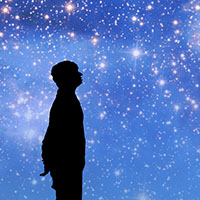A Touch of Awe: Crafting Meaning From the Wonder of the Cosmos SOLD OUT
 When: Wed., Feb. 7, 2018 at 7:00 pm - 8:30 pm
When: Wed., Feb. 7, 2018 at 7:00 pm - 8:30 pmWhere: New York Academy of Sciences
250 Greenwich St., 40th Floor
212-298-8600 Price: $15
Buy tickets/get more info now
See other events in these categories:
 The discoveries of modern science tell an epic story of the universe through its fourteen-billion-year history. Though modern humans are relative newcomers to this story, having only appeared some 200,000 years ago, what meaning can we glean from the history of the cosmos? From the birth of galaxies to the self-organizing dynamics of our planet to the ongoing expansion of the universe, the more we discover about the evolution of the cosmos, the more acutely we realize the enormity of what remains to be known.
The discoveries of modern science tell an epic story of the universe through its fourteen-billion-year history. Though modern humans are relative newcomers to this story, having only appeared some 200,000 years ago, what meaning can we glean from the history of the cosmos? From the birth of galaxies to the self-organizing dynamics of our planet to the ongoing expansion of the universe, the more we discover about the evolution of the cosmos, the more acutely we realize the enormity of what remains to be known.
Remarkably, over the past 100 years we have learned more about life in our universe than the entire history of humanity put together. Just this year astrophysicists at the University of Nottingham confirmed that there at least two trillion galaxies in the cosmos, ten times more than had previously been thought. And with over 90% of these galaxies yet to be studied, astrobiologists are hunting with renewed vigor for the existence of intelligent life on other planets. What guidance or wisdom can the study of cosmology and astrophysics offer us in our search for meaning and purpose? Theoretical physicists Paul Davies and Ard Louis, and astrophysicists Joel Primack and Lucianne Walkowicz tackle the “big questions” of existence — sharing their perceptions based on years of gazing upward and beyond our own intimate planet.
This event is part of the The Will to Meaning: Seeking the “Why” of Our Existence series.
Moderated by journalist Steve Paulson, Executive Producer of Wisconsin Public Radio’s To the Best of Our Knowledge, this three-part series at the New York Academy of Sciences brings together leading scientists and scholars to explore meaning through the lens of scientific inquiry.
Buy tickets/get more info now